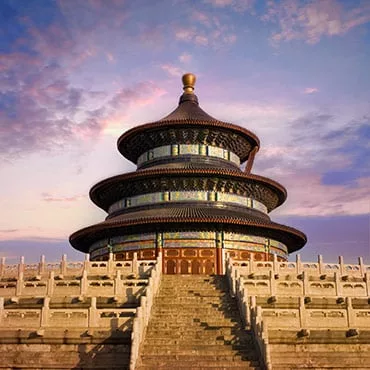
If you’re like most people who start reading about Chinese emperors, you’ll feel very quickly that you’ve disappeared down a gilded and extraordinarily rich rabbit hole.
There are just so many Chinese emperors and dynasties that even local Chinese people are confused by who did what and when. Let’s face it. A dedicated Chinese history expert would find it hard to wrap their head around every last imperial detail, and we both know that no tour of China is long enough for you to absorb it all. So, rather than provide a blow by blow description of all the Chinese emperors since time began, we thought, why not keep it super simple?
In this article we share fabulous facts and unlikely fiction that bring some of Chinese most fascinating emperors and their achievements (or lack of them) to life.
Let’s start with fabulous facts
China as we know it today is a relatively new concept. When considered in the context of Chinese history, emperors have reigned supreme in one way or another for a couple of thousand years.

Overall, there were an incredible 83 dynasties and reigns throughout Chinese history, and a remarkable 559 emperors and kings!
In China, the emperor was the absolute ruler; a symbol of heavenly power on earth. It might all sound wonderful, but life for a Chinese emperor really wasn’t all lavish ceremonies and disposable servants – although there was plenty of that. You’d think with an endless supply of riches and concubines at your disposal, not to mention access to the best in science and medicine, life would be sweet, however, not so. Being an emperor was dangerous business. With the constant threat to life from those ‘nearest and dearest’ to you, emperors’ lives were often brief and met with violent endings, with untimely death all too common. Some emperors even brought about their own demise, with attempts to reach immortality backfiring unceremoniously.
Here are a few fabulous facts about Chinese emperors.
| Emperor with the shortest lifespan (dying at just two years of age) | Liu Long (105 AD – 106 AD) Fifth emperor of the Eastern Han Dynasty |
| Emperor with the longest life (died at 89 years) | Qianlong Emperor (1711 AD – 1799 AD) Fifth emperor of the Qing dynasty |
| Oldest (and only female) emperor to ascend the throne | Wu Zetian (624 AD – 705 AD) Ruler of the late Tang dynasty and Wu Zhou |
| Shortest reign (just half a day!) | Wanyan Chenglin (1202 AD – 1234 AD) Last emperor of the Jin dynasty |
| Longest reign (61 years) | Kangxi Emperor (1654 AD – 1722 AD) Third emperor of the Qing dynasty |
| Number of emperors who lived past 80 years | 5 |
| Title given to the emperor by subjects during the feudal period | Bi Xia (Your Majesty) |
| Longest dynasty, ruling for more than 790 years | Zhou dynasty |
| Shortest dynasty, ruling for around a year | Northern Liao dynasty |
| Longest average reign for an emperor (Qing dynasty) | 27 years |
| Shortest average reign for an emperor (Northern Liao) | 5 months |
| Last emperor of China | Aisin Gioro Puyi Final Qing dynasty emperor. Abdicated the most times (three in total) |
The best and most of [Chinese emperors]

Chinese emperors are synonymous with the expansion of China in terms of geography, science, music, and culture. Reflecting the personal interests of the emperor at the time, many advances were made in different areas, with remarkable discoveries the fruits of their labor.
Here are just some of the stand out achievements.
| United China for the first time, commissioned the first Great Wall, and much more! | Emperor Qin Shihuang |
| First trip to the Western regions commenced in 139 BC | Instigated by Liu Che, seventh emperor of the Han dynasty |
| Most illustrious poet | Cao Pi, the first emperor of the state of Cao Wei in the Three Kingdoms period |
| Golden period in Chinese history, the reign of Zhenguan | Emperor Taizong, the second emperor of the Tang dynasty, his reign was regarded as the exemplar for emperors who followed in Chinese history |
| The Grand Canal (2,700km) | Emperor Yang of Sui, ordered the construction of the Grand Canal, a project which took six years and involved five million laborers |
| Commissioned the Forbidden City | Emperor Yongle, the third Ming dynasty emperor |
| Most enthusiastic about science (and ordered the earliest human dissections, experiments with flight, and research on artificial food) | Wang Mang of the short-lived Xin dynasty |
| Laziest emperor (during his 48 year reign he did not hold court for 28 years!) | Zhu Yijun, Wanli Emperor of Ming dynasty |
4 Chinese emperors western travelers should know
So with the fab facts out of the way, let’s dive into the detail of four Chinese emperors you really should know.
Qin Shihuang (259 BC – 210 BC): China’s first emperor

Prior to becoming unified for the first time under Qin Shihuang, China was beset by almost continuous feuding between the various tribes and states. It wasn’t called the Warring Period for nothing, right? But somehow, Shi Huang Di (yes, it means first emperor) managed to pull it all together.
Under Qin Shihuang, China enjoyed unprecedented centralization in its approach to political, economic, military, cultural, and diplomatic powers. It seems there was very little that could stop Emperor Qin who had many grandiose ideas that he happily invested funds and people to bring to life. We’ve already mentioned the Great Wall – it was Qin who kicked it off hoping to keep the Hans at bay – but his expansive vision didn’t stop there. He took it to the afterlife too. It was Qin who was responsible for the world’s largest (and probably only) underground army of some 8,000 terracotta soldiers, horses, weapons, and every conceivable comfort an earthly departed emperor could need.
Sadly, Emperor Qin came unstuck when with his attempt to achieve immortality. Legend has it that his court physicians concocted an alchemical formulation that poisoned him, however despite this rather unhappy end, he’s enjoyed an immortality of sorts with the Great Wall and Terracotta Army still standing as lasting legacies of his reign.
Genghis Khan (1162 AD – 1227 AD): The Mongol Empire

Genghis Khan was born in the Mobei grassland in 1162. From a family of warriors, it’s hardly a surprise that he continued in the family tradition. Historical relics indicated Genghis Khan established the Great Mongol Kingdom in 1206, and may indeed have carried a dual title of emperor and Great Khan.
Under Genghis Khan, the Mongol Empire expanded significantly. Under his rule, the Genghis Khan code Yassa – the world’s first written code – was developed, and the Mongolian Aristocratic republic system, based on aristocratic democracy, was established.
Wu Zetian (624 AD – 705 AD) – Holy God Emperor

Wu Zhao was the recognized female emperor. She entered court at the age of 14 as a cairen server for Emperor Taizong of the Tang Dynasty and wasn’t promoted for 12 years. Highly skilled at navigating the intrigue and troubles of court life, Wu finally became queen in 655, staying in that position until 683. At that time, her title was Queen of Heaven and Two Holy Gods’ with Emperor Gaozong, however Gaozong didn’t particularly enjoy politics and was prone to dizziness, so Wu did what any good Queen of Heaven would. She stepped into the fray and became the Empress Dowager of Tang Zhongzong and Tang Ruizong. Finally in 690, she became the empress regnant of the Wu Zhou.
While her life and court was filled with intrigue, power games, and murder, Wu did implement many positive measures during her time as a leader, with agricultural development, water conservation, and academic prowess through imperial examinations among her achievements.
The Last Emperor: Aisin Gioro Puyi

The last emperor of the Qing dynasty was also the last Chinese emperor. Puyi came to power at a time in China when great change was afoot. Things only accelerated under his time as emperor, as he was himself drawn by influences from the West. In 1911, revolution broke out in China, and in 1912 Puyi abdicated, bringing an end to Qing dynasty rule. After the September 18 Incident (Mukden Incident) in 1931, Puyi was installed as a puppet emperor in Manchukuo by the Japanese until 1945, when the Japanese surrendered. Puyi was caught by the Soviet Red Army trying to escape and escorted back to China where he was imprisoned and reformed at the Fushun War Criminals Management Center. In 1959 he received an amnesty decree and later became a member of the China National Committee. He finished life as an ordinary Chinese citizen, marrying a regular Chinese woman (his fourth marriage and fifth wife), finally dying of kidney cancer in 1967 at 61 years of age. The first half of Puyi’s life is shared in his autobiography, however there have been numerous adaptations of his life by others. Perhaps the most notable of these is The Last Emperor, an Oscar winning film based on his life story.
Fascinated by the life and times of Chinese emperors? We are too!
The rich legacy left by China’s emperors infiltrates every aspect of Chinese history, and we can showcase it to you on one of our fully guided multi-day small group and private tours. Our team of travel consultants can advise on enriching activities and experiences that will make for beautiful travel memories from your China vacation. Reach out – We are here to help!




 Beautiful China!
Beautiful China!





